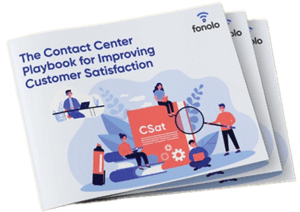Working in a call center can be extremely rewarding, especially for those who enjoy customer service and sales. But it’s up to management to promote call center motivation and create a work environment where their agents can gain a sense of satisfaction from their work.
It’s easy to say, “I’ll just hire someone who is self-motivated.” But even agents with strong work ethics are susceptible to burnout over time. If you plan to keep your team together for the long haul, you’ll want to make sure there are structures in place to support agent engagement efforts.
But which tactics are the right ones for your call center? To help you navigate this process, we’ll break down the different types of motivators and highlight proven tactics to help you and your call center team get on the right path.
Types of Motivators (And Why it Matters)
Selecting the right tactics to motivate your call center team can be overwhelming at first. A quick Google search will bring up a ton of tips and tricks, but it can be difficult to know which ones will work for you.
Most of these tips will fall into one of two categories: intrinsic and extrinsic motivators. Let’s break down what they mean:
Extrinsic Motivators
Extrinsic motivators are perhaps the most common type of motivator associated with the call center. These involve offering external or material rewards for achieving goals, such as prizes, cash bonuses, or recognition.
Here’s the kicker: while extrinsic motivators drive behavior, they can lower motivation in your employees. These often remind agents of their obligation to work and can reduce the likelihood they’ll go “above and beyond” in their role.
You can still use extrinsic motivators in the call center, but they shouldn’t be your primary tool for leading your team. Ideally, intrinsic motivators will make up the foundation of your agent engagement strategy.
Intrinsic Motivators
Intrinsic motivators, as you may have guessed, nurture agents from an internal perspective. These techniques focus on investing in your agents, developing their skill sets, and encouraging their professional growth and development.
To understand why intrinsic motivators are so effective, we need to consider basic human needs. Agents who feel supported, well-compensated, and happy at work will be better motivated to perform their daily tasks.
Once these basic needs are met, the next stage involves appealing to your employees’ sense of autonomy at work, helping them understand how their daily work contributes to the overall business and guiding them in becoming experts in their role.
TIP:
While call center metrics like AHT and FCR are great benchmarks for performance, they aren’t great motivators. Prioritizing agent satisfaction and efficiency is the most effective way to achieve results!
10 Ways to Keep Call Center Agents Motivated
Now comes the part you’ve been waiting for: our comprehensive list of motivational techniques for the call center. The methods below are all intrinsic motivators, making them all great additions to your agent engagement strategy.
1. Create a positive work environment.
Whether you work in an office or remotely, it’s important to foster a work culture that makes agents feel safe, supported, and cared for.
Agents should be able to keep a good work-life balance and shouldn’t hesitate to take paid leave as they need to. Flexible hours and schedules are also important parts of a successful work environment. In short, your agents should enjoy their time at work, and feel in control of their personal and professional commitments.
2. Start with management and leadership.
Remember the phrase, “do as I say, not as I do”? This line encapsulates what NOT to do when working to build agent engagement and motivation.
Leading by example is the best way to ensure your team emulates the culture and values you want to see in your contact center. Prioritize training your management and leadership teams and hold them to those best practices.
3. Set clear and attainable goals.
There are few things more demoralizing than unachievable goals. While managers may see high targets as inspirational, agents will rarely view it the same way.
It’s important to be realistic when setting targets with your agents and to make sure they are comfortable rising to the challenge. Setting SMART (Specific, Measurable, Attainable, Realistic, and Time-Bound) goals will help you achieve this.
4. Give them the right tools and technology.
No job is perfect, and call center work is no exception. At some point, every agent has been bogged down with processes and tasks that get in the way of completing their work. Fortunately, there’s excellent call center software that can automate the drab parts of the job, so your agents can spend more time supporting your callers.
High call volumes are the bane of every call center agent’s work. Long hold times make for unhappy callers, making phone conversations challenging right off the bat. By offering a call-back solution as an alternative to waiting on hold, agents can spend more time solving customer problems instead of managing their frustration.
TIP:
Call-backs are a call center’s best friend! Use them to lower abandonment rates, improve customer satisfaction (CSat), and much more. Learn more about call-backs here.
5. Encourage agent autonomy.
Your agents want to feel in control of their workdays, but that can be difficult to do if they don’t have the autonomy to do their work well. If they’re constantly waiting on approvals and escalations, it can hinder their overall performance.
By giving them the freedom to support their clients, you give them permission to go above and beyond in their work. Of course, you’ll need to invest in the proper training to make sure they’re up to the task. Trust us — it’s well worth the effort.
6. Assign special projects.
Call center work gets a bad rap for being repetitive and monotonous. Even the best call center agents will eventually tire of doing the same daily tasks over and over again.
This is where one-on-one meetings come in handy. Encourage call center managers to get to know their agents, their goals, and interests. Look out for special tasks and projects that you can entrust to your team members so they can expand their skill-sets while taking a much-deserved break from the phone lines.
7. Treat agents the way you treat your customers.
Did you know that agent satisfaction directly affects customer satisfaction? If agent engagement is low, you’ll start to see CSat dip as well. It’s one of many reasons why it’s important that your agents feel challenged, supported and engaged in their work.
Many of the tactics used in customer care can be applied to your employees. Focus on building strong relationships with them, and make sure you’re prioritizing their well-being. A workforce management tool can be helpful for tracking your progress as an organization.
8. Offer feedback to your agents.
Your agents want to know where they stand with your organization, so offering feedback is key. By highlighting the positives of their work, you remind them that they’re valued. Don’t sit on your compliments — they are meant to be heard!
Constructive feedback is also an important part of keeping employees motivated. By challenging them to improve their skills and abilities, they will become more invested in their work and growth with the organization. Which brings us to our next point…
9. Highlight growth opportunities.
In an ideal world, the agents you hire will stay with your organization for years to come. Agents will be more inclined to act on constructive feedback if they know their efforts are helping them advance their career.
To help them envision a future with your business, you need to show them the possibilities for career progression. Create a career plan with each of your agents and touch base with them regularly to ensure they’re on a path that will bring them professional satisfaction and growth.
10. Listen to what your agents have to say.
Your agents are skilled professionals with the ability to improve your business — so let them! Listen to their ideas and offer pathways to implement great suggestions. If they feel heard and see management taking their feedback seriously, they’ll be more inclined to step up and do their best work.
Don’t make the mistake of taking your team’s feedback and not following through. If an agent offers a suggestion, the worst thing you can do is leave it on the backburner. Make sure you follow through on their comments and supply updates whenever possible, so they know their comments are making a difference.

The Contact Center Playbook for Improving Customer Satisfaction
In this handy playbook, contact center leaders will learn the ins and outs of improving customer satisfaction.
